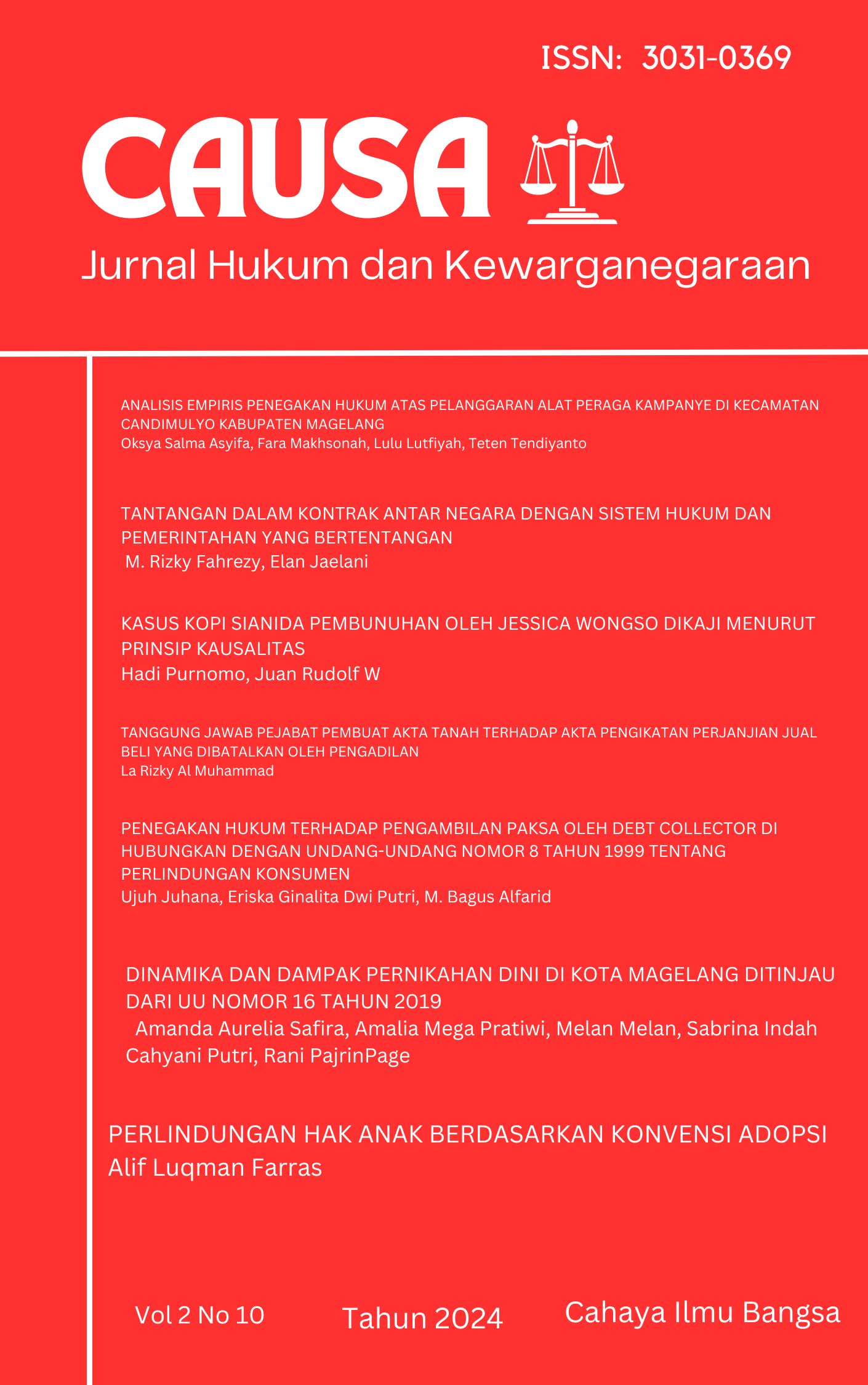TAHAPAN PEMBUATAN CEDAW (CONVENTION ON THE ELIMINATION OF ALL FORM OF DISCRIMINATION AGAINST WOMEN) DAN IMPLEMENTASINYA DI INDONESIA
- Authors
-
-
Daniella Sitanggang
Universitas Pembangunan Nasional “Veteran” JakartaAuthor
-
- Keywords:
- CEDAW, Convention, Ratification, Implementation., CEDAW, Konvensi, Ratifikasi, Implementasi.
- Abstract
-
This study aims to analyze the process of formulation, adoption, and implementation of the CEDAW Convention (Convention on the Elimination of All Forms of Discrimination Against Women) in the international legal system and evaluate its implementation in Indonesian national law. This study is a normative legal study that uses a statute approach and a historical approach. Data were collected through a literature study of international legal instruments, national laws and regulations, and official documents and reports from related institutions. The results of the study show that CEDAW was born from a long process in the international legal system and was officially adopted by the UN in 1979, then ratified by Indonesia through Law Number 7 of 1984. The implementation of CEDAW in Indonesia has been seen through the formation of various regulations and policies, including the ratification of the Law on the Crime of Sexual Violence and gender-friendly court guidelines. However, there are still various challenges such as the existence of laws that conflict with the principles of CEDAW, the lack of women's participation in politics, and the non-ratification of the Optional Protocol. Therefore, a stronger political commitment and legal harmonization are needed to ensure comprehensive protection of women's rights.
Penelitian ini bertujuan untuk menganalisis proses perumusan, pengadopsian, dan pemberlakuan Konvensi CEDAW (Convention on the Elimination of All Forms of Discrimination Against Women) dalam sistem hukum internasional serta mengevaluasi implementasinya dalam hukum nasional Indonesia. Penelitian ini merupakan penelitian hukum normatif yang menggunakan pendekatan perundang-undangan (statute approach) dan pendekatan historis (historical approach). Data dikumpulkan melalui studi kepustakaan terhadap instrumen hukum internasional, peraturan perundang-undangan nasional, serta dokumen dan laporan resmi dari lembaga terkait. Hasil penelitian menunjukkan bahwa CEDAW lahir dari proses panjang dalam sistem hukum internasional dan diadopsi secara resmi oleh PBB pada tahun 1979, lalu diratifikasi oleh Indonesia melalui Undang-Undang Nomor 7 Tahun 1984. Implementasi CEDAW di Indonesia telah terlihat melalui pembentukan berbagai regulasi dan kebijakan, termasuk pengesahan UU Tindak Pidana Kekerasan Seksual dan pedoman pengadilan yang ramah gender. Namun demikian, masih terdapat berbagai tantangan seperti keberadaan undang-undang yang bertentangan dengan prinsip-prinsip CEDAW, minimnya partisipasi perempuan dalam politik, dan belum diratifikasinya Protokol Opsional. Oleh karena itu, dibutuhkan komitmen politik dan harmonisasi hukum yang lebih kuat untuk menjamin perlindungan hak-hak perempuan secara menyeluruh.
- Downloads
- Published
- 2025-06-27
- Section
- Articles
How to Cite
Most read articles by the same author(s)
- Daniella Sitanggang, Divany Harbina Emzilena Kaban, PERAN ICRC SEBAGAI SUBJEK HUKUM INTERNASIONAL , Causa: Jurnal Hukum dan Kewarganegaraan: Vol. 14 No. 6 (2025): Causa: Jurnal Hukum dan Kewarganegaraan
Similar Articles
- Luqiana Halawati, Ruth Destyaningrum, PENEGAKAN HUKUM BIOLOGICAL AND TOXIN WEAPONS CONVENTION (BWC) DALAM MENCEGAH PROLIFERASI SENJATA BIOLOGIS , Causa: Jurnal Hukum dan Kewarganegaraan: Vol. 13 No. 6 (2025): Causa: Jurnal Hukum dan Kewarganegaraan
- Gina Azhara Nabilla. R, Sona Norana Kurnia Ilahia, Putri Ananda Asisti, Nabila Afifah, Desi Hafizah Sudirman, KAJIAN HUKUM PERAN PEMERINTAH DALAM PENGUSAHAAN PARIWISATA ALAM TAMAN WISATA ALAM (TWA) DANAU DAM TAK SUDAH PASCA ALIH STATUS DARI CAGAR ALAM , Causa: Jurnal Hukum dan Kewarganegaraan: Vol. 12 No. 11 (2025): Causa: Jurnal Hukum dan Kewarganegaraan
- Alita Aulia Maliq, Aulia Najla Faliskha, Denanda Zahra Ajrina , Swastika Rahmadhani, PERLINDUNGAN HUKUM BAGI KONSUMEN DALAM KASUS PENIPUAN UMRAH: ANALISIS TERHADAP PUTUSAN 41/PID.B/2024/PN.KDS , Causa: Jurnal Hukum dan Kewarganegaraan: Vol. 14 No. 3 (2025): Causa: Jurnal Hukum dan Kewarganegaraan
- Salsabila Aprilia, Baidhowi Baidhowi, ANALISIS PRINSIP-PRINSIP HUKUM EKONOMI SYARIAH DALAM PENGELOLAAN ZAKAT DAN WAKAF SEBAGAI INSTRUMRN PEMBERDAYAAN EKONOMI UMAT , Causa: Jurnal Hukum dan Kewarganegaraan: Vol. 13 No. 9 (2025): Causa: Jurnal Hukum dan Kewarganegaraan
- Jonathan Asido Sibarani, DINAMIKA HUKUM DAGANG INDONESIA DALAM ERA DIGITAL: TANTANGAN DAN ADAPTASI , Causa: Jurnal Hukum dan Kewarganegaraan: Vol. 15 No. 7 (2025): Causa: Jurnal Hukum dan Kewarganegaraan
- Arthur Anden, Karinawati Karinawati, Novia Fatmawati, Tia Aulia Hesy Noviana, Yuliana Yuliana, IMPLIKASI HUKUM DAN PERLINDUNGAN KREDITUR DALAM SISTEM HUKUM INDONESIA , Causa: Jurnal Hukum dan Kewarganegaraan: Vol. 13 No. 9 (2025): Causa: Jurnal Hukum dan Kewarganegaraan
- Bhagawanta Atyuta Pradhana, Dwi Putri Lestarika, Wevy Efticha Sary, TINDAK PIDANA TERORISME SEBAGAI KEJAHATAN TERHADAP KEMANUSIAAN DALAM PERSPEKTIF HUKUM PIDANA INTERNASIONAL DAN YURISDIKSI MAHKAMAH PIDANA INTERNASIONAL , Causa: Jurnal Hukum dan Kewarganegaraan: Vol. 12 No. 5 (2025): Causa: Jurnal Hukum dan Kewarganegaraan
- Yebi Febri, Gina Azhara Nabilla. R, Sona Norana Kurnia Ilahia, Salsabilah Salwa Septiani, Putri Ananda Asisti, Iskandar Iskandar, PERLINDUNGAN HUKUM TERHADAP DATA PRIBADI PELAMAR ASN DALAM PROSES REKRUTMEN CPNS/PPPK YANG MENGGUNAKAN ARTIFICIAL INTELLIEGENCE (AI) , Causa: Jurnal Hukum dan Kewarganegaraan: Vol. 13 No. 2 (2025): Causa: Jurnal Hukum dan Kewarganegaraan
- Wei Liuhua, ANALISIS EFEKTIVITAS PERLINDUNGAN HUKUM KONSUMEN TERHADAP PEREDARAN BARANG KW DI E-COMMERCE INDONESIA , Causa: Jurnal Hukum dan Kewarganegaraan: Vol. 14 No. 6 (2025): Causa: Jurnal Hukum dan Kewarganegaraan
- Gunawan Widjaja, Songga Aurora Abadi, Anike Marandof, ANALISIS TERHADAP IMPLEMENTASI KEPPRES NO. 63 TAHUN 2004 DI PT FREEPORT INDONESIA , Causa: Jurnal Hukum dan Kewarganegaraan: Vol. 14 No. 12 (2025): Causa: Jurnal Hukum dan Kewarganegaraan
You may also start an advanced similarity search for this article.

